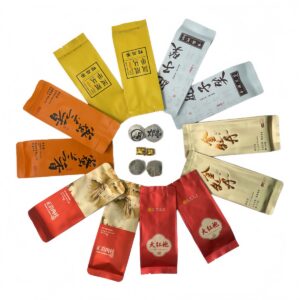Pu Erh tea for gut health opens a door to centuries-old wisdom and profound sensory delight. From the first waft of its earthy aroma to the warm amber liquid that glides across your tongue, this ancient brew nurtures digestion, soothes discomfort, and cultivates balance deep within. Imagine a gentle embrace for your belly: each sip of Pu Erh tea carries living probiotics and natural enzymes that calm bloating and support vibrant gut flora.
In this guide, we’ll explore what makes Pu Erh tea unique, how it nurtures digestive wellness, its broader Pu Erh tea benefits (including its impact on Pu Erh tea and blood pressure), and how to choose and brew your perfect cup. Prepare to embark on a holistic journey—from Yunnan’s misty tea mountains to your morning ritual—that honors mind, body, and gut.
What Is Pu Erh Tea?
Pu Erh tea is a post-fermented tea hailing from Yunnan Province, China. Unlike green or black teas, Pu Erh tea undergoes a unique microbial fermentation:
- Raw Pu Erh Tea (Sheng): Fresh leaves are sun-withered, gently rolled, and compressed into cakes or loose leaf, then naturally aged over years. Young raw Pu Erh bursts with brisk vegetal notes; aged vintages mellow into honeyed complexity.
- Ripe Pu Erh Tea (Shu): Through “wet piling,” leaves ferment under controlled heat and humidity, producing a smooth, chocolatey brew within months—perfect for a soothing digestive tonic.
This living process creates a tea rich in probiotics, enzymes, and theabrownins—components at the heart of Pu Erh tea for gut health.

How Pu Erh Tea Supports Gut Health
Fermentation-Derived Probiotics & Enzymes
The magic of Pu Erh tea for gut health lies in its fermentation. Beneficial microbes transform leaf polyphenols into:
- Active Enzymes: Aid breakdown of complex fats and proteins.
- Probiotic Cultures: Support balanced intestinal flora.
- Prebiotic Fibers: Nourish good bacteria for smoother digestion.
These living compounds work together to soothe occasional bloating, enhance nutrient absorption, and fortify your microbiome.
Soothing Digestion & Reducing Bloating
Imagine that uneasy fullness after a hearty meal melting away. A cup of Pu Erh tea, gently warm and velvety in texture, calms digestive spasms and eases gas. The natural acidity helps regulate stomach pH, while tannins gently tone the gut lining—like a soft balm on sensitive tissues.
Interaction with Gut Microbiome
Regular sipping of Pu Erh tea for gut health cultivates microbial diversity. Studies suggest fermented teas can increase populations of beneficial bacteria such as Lactobacillus and Bifidobacterium, leading to:
- Improved bowel regularity
- Enhanced immune defense
- Greater overall vitality
Broader Pu Erh Tea Benefits
While our focus is the gut, Pu Erh tea benefits extend further:
Pu Erh Tea and Blood Pressure
Gentle vasodilatory effects from theabrownins and mild caffeine can support healthy circulation and blood pressure. For those mindful of cardiovascular wellness, pairing Pu Erh with a balanced diet—and consulting a healthcare provider—offers a flavorful strategy for heart health.
Metabolism Boost & Weight Management
Incorporate Pu Erh tea into a Pu Erh tea for weight loss diet to leverage its metabolism-enhancing polyphenols. A cup before meals may help regulate appetite and gently raise energy expenditure, making sustainable weight management both pleasant and natural.
Antioxidant & Anti-Inflammatory Effects
Rich in catechins and theaflavins, Pu Erh tea combats oxidative stress and systemic inflammation, protecting cells from damage and supporting long-term wellness.
Best Pu Erh Tea Varietals for Digestive Wellness
Aged Pu Erh Tea
Aged Pu Erh tea offers mellow flavors and reduced astringency, ideal for a sensitive gut. Vintage cakes develop notes of dried fruit, molasses, and forest floor—luxury in every sip.
Raw Pu Erh Tea
Young raw Pu Erh tea brims with live probiotics and brisk vegetal energy. Its vibrant profile stimulates gut motility, perfect for morning rituals seeking digestive kickstart.
Ripe Pu Erh Tea
With its smooth, chocolatey depth, ripe Pu Erh tea wraps the gut in soothing warmth. The accelerated fermentation yields a tea that’s gentle yet effective at quelling discomfort after heavy meals.

How to Choose Quality Pu Erh Tea for Gut Health
- Form Matters:
- Cakes (Bingcha): Traditional, ideal for aging and nuances.
- Bricks (Zhuancha): Dense, convenient storage.
- Loose Leaf (Maocha): Quick infusion, vibrant probiotic activity.
- Origin & Age Labels:
Look for clear markings: region (Yiwu, Bulang, Menghai) and harvest year. Older batches (10–30 years) tend to be gentler on digestion. - Leaf Appearance & Aroma:
Intact leaves with golden tips and a clean, earth-sweet scent signal proper processing. Avoid musty or chemical notes. - Trusted Vendors & Storage:
Purchase from reputable tea houses. Store in a cool, dry, odor-free environment to preserve live cultures.
Brewing Pu Erh Tea to Maximize Gut Benefits
Rinse & Awaken Leaves
Quickly rinse leaves with near-boiling water (5–10 seconds) to remove dust and prime the fermentation compounds for release.
Water Temperature & Steep Time Guidelines
- Ripe Pu Erh Tea: 95–100 °C; 20–30 s initial steep, extend by 10 s for up to 6 infusions.
- Raw Pu Erh Tea: 95–100 °C; 10–15 s start, gradually increase to 30 s over 8–10 steeps.
Gongfu-Style vs. Western-Style Brewing
- Gongfu-Style: High leaf-to-water ratio, quick multiple infusions—brings out layered textures and probiotics.
- Western-Style: 1–2 tsp per cup, 3–5 min single steep—perfect for everyday convenience.
Mindful brewing ensures you extract maximal gut-supporting compounds without excess caffeine.
🔗 For more tea brewing methods, check out the YouTube video explaining the brewing methods.
Integrating Pu Erh Tea into Your Daily Routine
- Morning Digestive Ritual: Begin with a bright raw Pu Erh tea to kickstart motility and nutrient absorption.
- Pre- or Post-Meal Sip: A small cup of ripe Pu Erh tea before or after meals eases digestion and reduces bloating.
- Pairing with Gut-Healthy Diet: Complement with fiber-rich vegetables, fermented foods, and lean proteins for a holistic gut regimen.
FAQs: Pu Erh Tea for Gut Health
- How much Pu Erh tea should I drink daily?
Aim for 2–3 cups, adjusting to tolerance and digestive response. - Can Pu Erh tea replace probiotics?
While not a substitute for clinical probiotics, Pu Erh supports gut flora as part of a balanced diet. - Any side effects for sensitive stomachs?
Over-steeping can increase tannins; opt for shorter steeps and choose aged or ripe Pu Erh tea.
Conclusion: Embrace Pu Erh Tea for Gut Health
With roots in ancient Yunnan and a science-backed profile, Pu Erh tea for gut health offers a delicious, ritualistic path to digestive harmony. By selecting quality teas, mastering mindful brewing, and weaving Pu Erh into balanced routines, you nourish your microbiome and elevate daily wellness. Sip slowly, savor each nuance, and let Pu Erh tea guide you toward a calmer, healthier gut.



